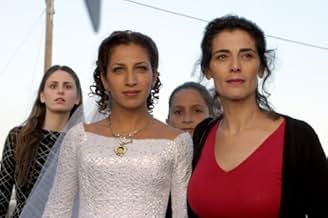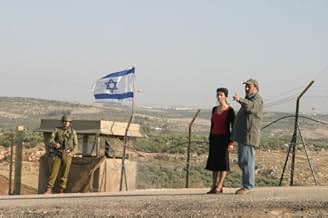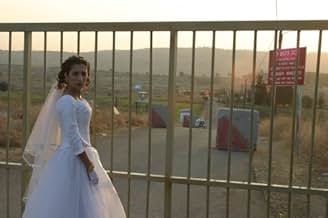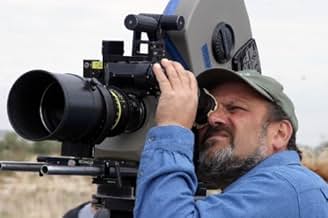NOTE IMDb
7,4/10
3,5 k
MA NOTE
Mona doit se rendre en Syrie pour finaliser les détails du mariage arrangé entre elle et son cousin, une star de la télé. Mona sait qu'une fois là-bas, elle ne pourra plus jamais revoir sa f... Tout lireMona doit se rendre en Syrie pour finaliser les détails du mariage arrangé entre elle et son cousin, une star de la télé. Mona sait qu'une fois là-bas, elle ne pourra plus jamais revoir sa famille sur le plateau du Golan.Mona doit se rendre en Syrie pour finaliser les détails du mariage arrangé entre elle et son cousin, une star de la télé. Mona sait qu'une fois là-bas, elle ne pourra plus jamais revoir sa famille sur le plateau du Golan.
- Réalisation
- Scénario
- Casting principal
- Récompenses
- 8 victoires et 15 nominations au total
Hiam Abbass
- Amal
- (as Hiyam Abbass)
Makram Khoury
- Hammed
- (as Makram J. Khoury)
Ashraf Barhom
- Marwan
- (as Ashraf Barhoum)
Evelyn Kaplun
- Evelyna
- (as Evelyne Kaplun)
Adnan Tarabshi
- Amin
- (as Adnan Trabshi)
Marlene Bajali
- The Mother
- (as Marlene Bajjali)
Uri Gavriel
- Simon
- (as Uri Gabriel)
Robert Henig
- Joseph
- (as Robert Hoenig)
Commentaire à la une
"The Syrian Bride" uses the familiar comic genre of the colliding tensions in an extended family wedding to humanistically illuminate Middle East political, gender, generational, religious, modernization and economic tensions coming down to human relationships vs. bureaucracies.
Co-writers Suha Arraf (a Palestinian journalist) and Israeli director Eran Riklis pile almost too much on to this one Druze (Israeli Arab) family living in the occupied Golan Heights in order to make the personal political. The tensions, poignancy and symbolism of a wedding are heightened because when this bride leaves her home for her arranged marriage with a Syrian celebrity, she will not be able to return home.
Every complicated character has a complicated background, whether theirs or their parents' politics or their religiosity or their dress or their educational or romantic aspirations-- and is in a complicated relation to every other character and the authorities.
In addition to the return of prodigal sons from overseas, the larger community intrudes on the intra-family tensions, from robed tribal elders and the police who each bring warnings of proper behavior to a comical videographer. My dependency on English subtitles lessened some of the impact of hearing characters switch from Arabic to Hebrew to French to Russian to English to communicate, as part of the interactions are based on who can understand different languages and who can't. This complex in-gathering all symbolically happens the same day as a demonstration in support of the change over of power in Syria from the father the dictator to the son, while a flat tire leads to a crucial delay. The ubiquitous television, and government attention, however, is focused on the West Bank, making this border a forgotten zone as well as a no (wo)man's land.
What makes it all hang together amidst this human comedy is the central focus from the start to the finish on the almost silent bride, dressed in Western white, and her more verbal older sister, rebelliously in slacks, and both played by powerful actresses. Each has made choices in the past they regret and each chooses their future now, despite the efforts of all their male relatives, let alone global politics, to thwart them and make them helpless.
Even with the heavy-handed baggage of all the "Crash"-like coincidences, the film beautifully makes the point that politics isn't just ideology but affects how people get on with the basics of their lives.
Co-writers Suha Arraf (a Palestinian journalist) and Israeli director Eran Riklis pile almost too much on to this one Druze (Israeli Arab) family living in the occupied Golan Heights in order to make the personal political. The tensions, poignancy and symbolism of a wedding are heightened because when this bride leaves her home for her arranged marriage with a Syrian celebrity, she will not be able to return home.
Every complicated character has a complicated background, whether theirs or their parents' politics or their religiosity or their dress or their educational or romantic aspirations-- and is in a complicated relation to every other character and the authorities.
In addition to the return of prodigal sons from overseas, the larger community intrudes on the intra-family tensions, from robed tribal elders and the police who each bring warnings of proper behavior to a comical videographer. My dependency on English subtitles lessened some of the impact of hearing characters switch from Arabic to Hebrew to French to Russian to English to communicate, as part of the interactions are based on who can understand different languages and who can't. This complex in-gathering all symbolically happens the same day as a demonstration in support of the change over of power in Syria from the father the dictator to the son, while a flat tire leads to a crucial delay. The ubiquitous television, and government attention, however, is focused on the West Bank, making this border a forgotten zone as well as a no (wo)man's land.
What makes it all hang together amidst this human comedy is the central focus from the start to the finish on the almost silent bride, dressed in Western white, and her more verbal older sister, rebelliously in slacks, and both played by powerful actresses. Each has made choices in the past they regret and each chooses their future now, despite the efforts of all their male relatives, let alone global politics, to thwart them and make them helpless.
Even with the heavy-handed baggage of all the "Crash"-like coincidences, the film beautifully makes the point that politics isn't just ideology but affects how people get on with the basics of their lives.
Histoire
Le saviez-vous
- AnecdotesMakram Khoury and Clara Khoury are father and daughter in the film as well as in real life.
- GaffesMona's father says he has raised her for 25 years. However, she states her birth date as November 30th 1976 and the movie is set on July 17th 2000. That would make her only 23 years old.
- ConnexionsFeatured in The Making of The Syrian Bride (2005)
- Bandes originalesBride Theme
Music Composed & Conducted by Cyril Morin
Performed by Bulgarian Symphony Orchestra-Sif 309
Meilleurs choix
Connectez-vous pour évaluer et suivre la liste de favoris afin de recevoir des recommandations personnalisées
- How long is Syrian Bride?Alimenté par Alexa
Détails
Box-office
- Montant brut aux États-Unis et au Canada
- 380 505 $US
- Week-end de sortie aux États-Unis et au Canada
- 7 235 $US
- 20 nov. 2005
- Montant brut mondial
- 1 522 967 $US
- Durée1 heure 37 minutes
- Couleur
- Mixage
- Rapport de forme
- 2.35 : 1
Contribuer à cette page
Suggérer une modification ou ajouter du contenu manquant

































